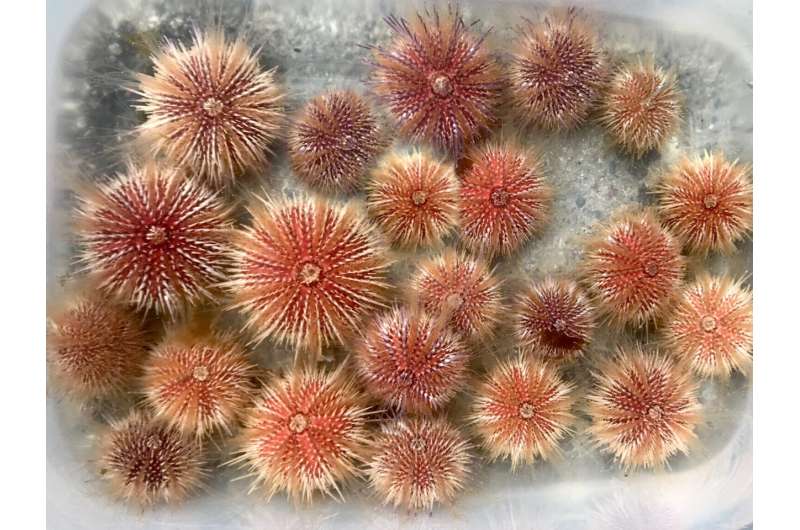
Sea urchins exposed to diluted seawater for long periods show signs of physical deterioration, according to scientists from the British Antarctic Survey, the University of Cambridge, and the Scottish Association for Marine Science. Their study also found that even slight changes in salinity—or saltiness—trigger changes in urchin behavior as they try to cope with their new conditions.
Urchins are slow-moving bottom feeders, making them especially vulnerable to rapid changes to their habitat. In the UK, climate change is predicted to ‘freshen’ many coastal areas, so the research underscores the potential impact of climate-induced rainfall changes on these marine animals and their broader ecosystems.
As our climate warms, Britain’s weather is becoming more extreme; in Scotland, precipitation has increased by 20% since the 1960s. Salinity is one of the critical environmental factors that affect the biology of marine organisms, with increased rainfall and glacial melting reducing the salinity of coastal waters.
The researchers exposed European sea urchins at the Scottish Association for Marine Science in Oban to conditions mimicking those that could occur under future climate scenarios, with salinity ranging from 31 parts salt per thousand (‰)—that of ambient seawater—to a more extreme scenario dropping to 11‰.
Over an initial 24-hour period, and later for 25 days, the team measured how much oxygen the creatures consumed, how quickly they fed, and their ability to flip themselves over if they toppled.
In the mid-salinity water, the scientists observed changes in behavior, but the sea urchins showed clear signs of adjustments and tolerance, indicating they could survive long-term at this level if conditions change in the environment.
But immersed in less salty water—around 21‰ —the urchins’ physical condition deteriorated: they became sluggish, eating less and breathing more rapidly. They lost spines and body mass, and their tube feet discolored, indicating severe stress.
Nicholas Barrett, a Ph.D. student at the British Antarctic Survey and the Department of Earth Sciences at the University of Cambridge, says, “Coastal waters are predicted to freshen as climate changes because of increased rainfall and glacial melting, and salinity is one of the main factors impacting the physiology and ecology of marine life.”
“Though it was heartening to see the sea urchins successfully adjust to some reduction in salinity, further reductions had a dramatic impact on the animal’s health, suggesting their long-term survival could be severely compromised.”
“This urchin species plays a crucial role in controlling the growth of various large kelp seaweeds. Its disappearance could, therefore, upset the delicate balance of coastal ecosystems.”
Controlled salinity experiments like these differ from the natural acclimatization process that urchins may exhibit in the wild, but this research offers a clear prediction of how this species may fair under future heavy rainfall induced by climate change.
The research is published in the Journal of Experimental Biology.
More information:
Nicholas J. Barrett et al, Behavioural and physiological impacts of low salinity on the sea urchin Echinus esculentus, Journal of Experimental Biology (2023). DOI: 10.1242/jeb.246707
Citation:
Increased rainfall threatens UK sea urchins: Study (2024, February 12)
retrieved 13 February 2024
from https://phys.org/news/2024-02-rainfall-threatens-uk-sea-urchins.html
This document is subject to copyright. Apart from any fair dealing for the purpose of private study or research, no
part may be reproduced without the written permission. The content is provided for information purposes only.







